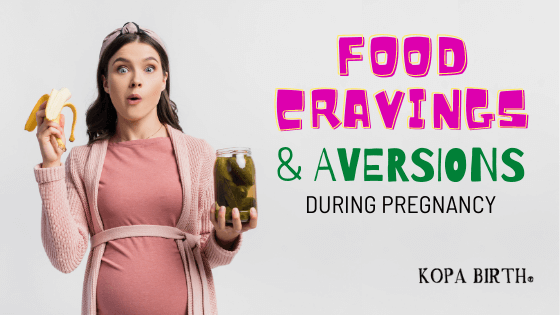
Food cravings and aversions during pregnancy are probably one of the most common symptoms represented in pop culture. Everyone is familiar with the old pregnancy trope about women eating pickles and ice cream. In reality, pregnant women often do find themselves craving or avoiding certain foods. Let’s look deeper at pregnancy cravings and aversions, and how you can be sure you’re maintaining a healthy diet for you and your little one.
Estimated reading time: 4 minutes
Many women report craving certain foods while pregnant, and about 60% of women say they have food aversions at some point during pregnancy (1, 2). But why?
You may find yourself suddenly craving things you never cared about before — spicy foods, a particular ice cream flavor, salty olives or pickles, sour lemons. Or you may be obsessively drawn to foods that you’ve liked all along. If you’re lucky enough to find yourself craving fresh vegetables and fruits, feel free to give in to those cravings!
If, however, you find yourself wildly craving foods that are loaded with empty calories, or are high in fat or sugar, you will need to show more restraint. It is okay to eat treats in moderation. Just take care not to overindulge.
When unhealthy cravings arise, try having another snack first. Or you can slip in a substitution. For example, chew some gum or have a piece of fruit if you’re craving sugar. Try a baked potato if you’re craving french fries. Or substitute frozen yogurt or a fruit sorbet if you’re craving ice cream.
Whatever your cravings are, make sure you’re still getting a variety of foods to meet your nutritional needs. If you restrict your diet too much, you might find yourself missing important nutrients (5). Take a look at what you’re eating over the course of a week and be sure it represents a balanced, healthy diet.
March of Dimes Eating Healthy During Pregnancy is a great place to get an idea of how you should be eating.
Perhaps instead of (or in addition to) food cravings during pregnancy, you’re faced with food aversions. Foods that you previously tolerated may seem absolutely repulsive to you now. If you have aversions, no worries. There really isn’t a single food that you absolutely have to eat.
Still, keep an eye on maintaining a nutrient-rich, balanced diet. If you can’t stand the thought of meat, look to plant-based protein sources like eggs, beans, and nuts. Say you hate the idea of all leafy greens — try hiding them by blending them into a smoothie. Get creative!
Pica is a craving for nonfood items, and it is more common in pregnancy than in the non-pregnant population. A person with pica might crave clay, dirt, chalk, or laundry starch, for example (3,5). Doctors aren’t sure what causes pica, though some think it may be caused by a lack of iron or other nutrient deficiencies (3).
Most women recognize the danger of eating non-food items, but may still feel hesitant to discuss the cravings with their provider. Sure, no one wants to admit that they feel like eating dirt… but resist the urge to feel ashamed. Pica is common enough that your doctor or midwife will not be surprised by your struggle. They are there to help you and will work with you to test your nutrient levels and develop a plan to manage cravings healthfully.
Kopa Birth’s online birthing classes allow you to prepare for a natural hospital birth from the comfort of your own home, 24/7. Enroll today in our free online childbirth class and start preparing for your natural birth!
Food cravings and aversions during pregnancy are probably one of the most common symptoms represented in pop culture. Everyone is familiar with the old pregnancy trope about women eating pickles